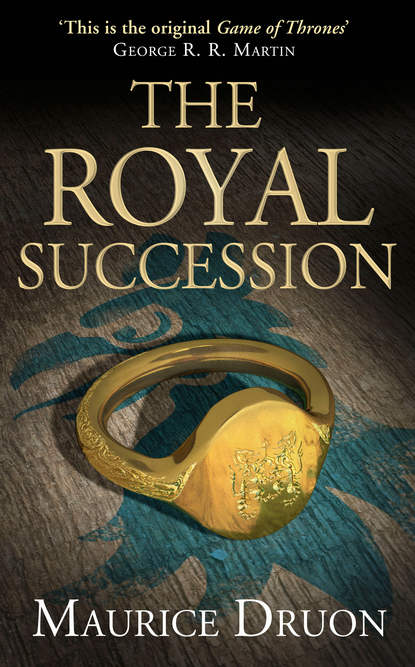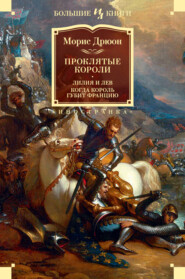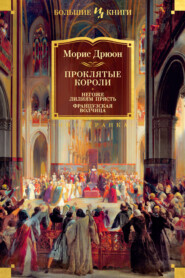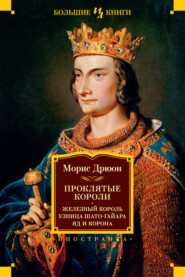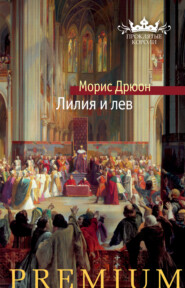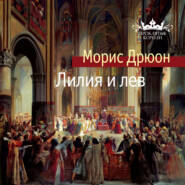По всем вопросам обращайтесь на: info@litportal.ru
(©) 2003-2025.
✖
The Royal Succession
Автор
Год написания книги
2019
Настройки чтения
Размер шрифта
Высота строк
Поля
‘You know well, Monseigneur,’ continued Duèze, ‘that at one moment we ran the risk of schism; and indeed we still do so. Our Italians refused to meet in France and they let it be known, but a little while ago, that if a Gascon Pope were elected, they would refuse him recognition and would set up a Pope of their own in Rome.’
‘There will be no schism,’ said the Count of Poitiers calmly.
‘Thanks to you, Monseigneur, thanks to you. I am happy to recognize it, and I tell everyone so. Going, as you have, from town to town with sage advice, if you have not yet found the shepherd, you have at least gathered the flock.’
‘Expensive sheep, Monseigneur! Do you know that I left Paris with sixteen thousand livres, and that only the other week I had to have as much again sent to me? Jason was nothing compared to me. I hope that all these golden fleeces won’t slip through my fingers,’ said the Count of Poitiers, screwing up his eyes slightly to look the Cardinal in the face.
The Cardinal, who had done very well out of this largesse by roundabout ways, did not take up the allusion directly but replied: ‘I think that Napoléon Orsini and Albertini de Prato, and perhaps even Guillaume de Longis, who was Chancellor to the King of Naples before me, might be fairly easily detached. Avoiding schism is worth the price.’
Poitiers thought: ‘He has used the money we gave him to acquire three of the Italian votes. It’s clever of him.’
As for Caetani, though he continued to play an implacable game, he was not in so strong a position since his practice of sorcery and his attempt to cast a spell on the King of France and the Count of Poitiers himself had been discovered. The ex-Templar Everard, a half-wit, whom Caetani had used for his devilish work, had talked rather too much before giving himself up to the King’s men.
‘I am holding that matter in reserve,’ said the Count of Poitiers. ‘The smell of the faggots might, at the right moment, make Monseigneur Caetani a little more pliant.’
At the thought of seeing another Cardinal grilled, a very slight and furtive smile passed over the aged prelate’s thin lips.
‘It seems that Francesco Caetani’, he went on, ‘has quite abandoned God’s affairs to devote himself entirely to Satan’s. Do you think that, having failed with sorcery, he managed to strike at the King, your brother, with poison?’
The Count of Poitiers shrugged his shoulders.
‘Whenever a king dies, it’s asserted that he was poisoned,’ he said. ‘It was said of my ancestor, Louis VIII; it was said of my father, whom God keep. My brother’s health was poor enough. Still, one must take the possibility into account.’
‘Finally,’ Duèze went on, ‘there is the third party, which is called Provençal because of the most turbulent among us, Cardinal de Mandagout.’
This last party numbered only six Cardinals of diverse origin; southerners, such as the brothers Bérenger Frédol, were allied in it with Normans and with one member from Quercy, Duèze himself.
The gold lavished on them by Philippe of Poitiers had made them more receptive to the arguments of French policy.
‘We are the smallest, we are the weakest,’ said Duèze, ‘but our votes are decisive in any majority. And since the Gascons and the Italians each refuse to elect a Pope from the other party, then, Monseigneur …’
‘They’ll have to take a Pope from your party, won’t they?’
‘I believe so, I firmly believe so. I’ve said so ever since Clement died. No one listened to me; doubtless people thought I was preaching on my own behalf, for indeed my name had been mentioned without my wishing it. But the Court of France has never placed much confidence in me.’
‘It was because you were rather too openly supported by the Court of Naples, Monseigneur.’
‘And had I not been supported by someone, Monseigneur, who would have paid any heed to me at all? Believe me, I have no other ambition than to see a little order restored to the affairs of Christendom which are in a bad way; it will be a heavy task for the next successor to Saint Peter.’
The Count of Poitiers clasped his long hands together before his face and thought for a few seconds.
‘Do you think, Monseigneur,’ he asked, ‘that the Italians would agree to the Holy See remaining in Avignon in return for the satisfaction of not having a Gascon Pope, and that the Gascons, in return for the certainty of Avignon, would agree to renounce their own candidate and rally to your third party?’
By which he in fact meant: ‘If you, Monseigneur Duèze, became Pope with my support, would you formally agree to preserving the present residence of the papacy?’
Duèze perfectly understood.
‘It would, Monseigneur,’ he replied, ‘be the wise solution.’
‘I am grateful for your valuable advice,’ said Philippe of Poitiers, rising to his feet to put an end to the audience.
He showed the Cardinal out.
When two men, who to all seeming are utterly diverse in age, appearance, experience and position, recognize each other as of similar quality and believe that mutual collaboration and friendship are possible between them, it is due more to the mysterious conjunctions of destiny than to the words they may exchange.
When Philippe bowed to kiss his ring, the Cardinal murmured, ‘You would make an excellent regent, Monseigneur.’
Philippe straightened up. ‘Does he realize that I have been thinking all this time of nothing else?’ he wondered. And he replied: ‘Would you not yourself, Monseigneur, make an excellent Pope?’
And they could not help smiling discreetly to each other, the old man with a sort of paternal affection, the young man with friendly deference.
‘I will be beholden to you,’ Philippe added, ‘if you will keep secret the grave news you have brought me until it is publicly announced.’
‘I will do so, Monseigneur, in order to serve you.’
Left alone, the Count of Poitiers reflected only for a few seconds. Then he summoned his first chamberlain.
‘Adam Héron, has no courier arrived from Paris?’ he asked.
‘No, Monseigneur.’
‘Then close all the gates of Lyons.’
4 (#ulink_63ae173e-76a8-58d7-8892-276761b0c621)
Let us Dry our Tears (#ulink_63ae173e-76a8-58d7-8892-276761b0c621)
THAT MORNING THE PEOPLE of Lyons were without vegetables. The market-gardeners’ wagons had been stopped outside the walls, and the housewives were clamouring in the empty markets. The only bridge, that over the Saône (for the one over the Rhône had not yet been completed), was barred by soldiery. But if one could not enter Lyons, one could not leave it either. Italian merchants, travellers, itinerant friars, reinforced by loungers and idlers, gathered about the gates and demanded an explanation. The guard invariably replied: ‘The Count of Poitiers’s orders,’ with the distant and important air that agents of authority tend to adopt when executing an order they do not understand.
People were shouting:
‘But my daughter is ill at Fouvière …’
‘My barn at Saint-Just burned down yesterday at vespers …’
‘The bailiff of Villefranche will have me arrested if I don’t take him my poll-tax today …’
‘The Count of Poitiers’s orders!’
And when the crowd began to press forward, the royal sergeants-at-arms raised their maces.
There were strange rumours going round the town.
Some declared that there was going to be war. But with whom? No one could say. Others asserted that a bloody riot had taken place during the night near the Augustinian monastery between the King’s men and those of the Italian Cardinals. Horses had been heard going by. Even the number of the dead was mentioned. But at the Augustinians’ all was quiet.
The Archbishop, Pierre de Savoie, was very anxious, wondering whether the events which had taken place before 1312 were about to begin all over again and whether he would be compelled to abandon, to the advantage of the archbishopric of Sens, the primacy of the Gaules, the only prerogative he had succeeded in preserving when Lyons had been attached to the Crown.
He had sent one of his canons for news; but the canon, having gone to the Count of Poitiers’s lodging, had been met by a curtly silent equerry. And now the Archbishop was expecting an ultimatum.





